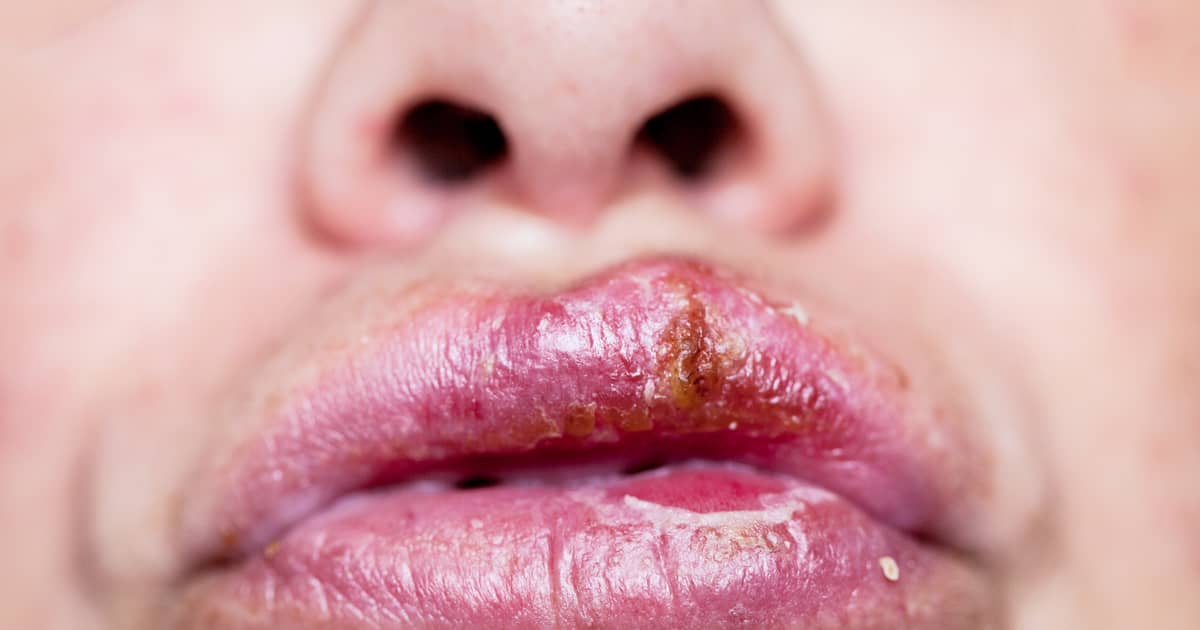While herpes infections are so incredibly common, there still seem to be lots of misconceptions about them.
There are two types of herpes viruses – HSV-1 that can cause oral herpes (cold sores) and HSV-2 that is sexually transmitted and causing genital herpes. While the two viruses are related, they’re different from each other.
Genital herpes affects an estimated 491 million people across the world or approximately 13 percent of the global population aged 15 to 49, the World Health Organization (WHO) reports. It’s a sneaky kind of STD. Genital herpes infections are often free of symptoms but the virus can still be passed to another person. And since an individual isn’t experiencing any kind of discomfort, the likelihood of them getting tested goes down.
The manner in which HSV-2 passes from one person to another is fairly easy to understand. Still, some people have questions about it. Is it possible to get genital herpes through exposure to HSV-1 through activities like kissing, for example? Let’s check the science that will give an answer to the question.
The Likelihood of Getting Genital Herpes from Oral Herpes
Since there are many similarities between HSV-1 and HSV-2, there’s some possibility of the two viruses reaching a part of the body that they’re not usually prone to being within.
A person who has HSV-1 (a mouth sore) can transmit the virus to the genitals of a partner through activities like oral sex.
Activities like kissing on the mouth cannot contribute to getting genital herpes. In such cases, the one who kisses an infected person is likely to get a mouth sore because the virus will settle in the mouth area.
The same rules apply to HSV-2. A person who has a genital herpes can pass it to the mouth of a partner if they receive oral sex. In that case, HSV-2 or genital herpes will be causing symptoms that are commonly linked to oral herpes.
Whenever you get HSV-1 in your genital region, it will cause the symptoms of genital herpes and vice versa. This is the main reason why being cautious about sexual practices is the most effective way to protect yourself from common types of STDs like herpes.
Getting Infected with Herpes Twice?
The statement in the previous section of the guide contradicts common wisdom that states you cannot get a herpes infection twice. In other words, there is a widespread belief that if you have one kind of herpes, it’s impossible to get infected with the other.
This misconception is wrong and very, very dangerous.
Numerous studies show that people can have a simultaneous oral herpes and genital herpes infection. Furthermore, such infections can be caused by the same virus.
Hence, you shouldn’t rest assured that you can’t get infected once again if you already suffer from cold sores and if your partner has them, as well. The HSV-1 virus can cause a genital herpes infection, regardless of its presence in your body already.
How Important Is Personal Protection?
In many parts of the world, a genital herpes infection is not taken seriously by doctors unless it causes symptoms. The CDC in the US, for example, does not recommend testing for genital herpes in people who do not have symptoms of the infection.
Should you be worried about hidden herpes or an eventual infection from your current sexual partner?
According to CDC, a positive herpes test in someone who is asymptomatic will not change their sexual behaviours. But this doesn’t mean that tests should be avoided.
Genital herpes isn’t a harmless infection. It can lurk in the human body for years until an eventual flare-up occurs. That flare-up will cause some common symptoms like pain and itching in the genital or anal region, the appearance of blisters, ulcers and scabs.
This kind of infection can also lead to complications.
In pregnant women, an active genital herpes infection can increase the risk of miscarriages. In addition, the herpes virus can be passed on from a mother to their unborn child. While rare, a potentially deadly infection called neonatal herpes can occur after normal delivery rather than C-section. Women who are pregnant and who have the STI could be treated with anti-herpes medications towards the end of their pregnancy to reduce the risk of complications.
Complications can also occur in non-pregnant women. Having an HSV-2 infection increases the risk of contracting another kind of STI. In addition, the herpes virus can contribute to frequent and recurring bladder infections. Rectal inflammation or proctitis can also occur in people who are positive for HSV-2.
It’s very important to have an open and honest conversation with your sexual partner about getting tested for the most common types of STIs. This is a personal choice but since screening is readily available in Singapore, you should definitely consider it.
Shim Clinic is a STD Clinic in Singapore offer comprehensive screening panels, including HSV-2 testing. You can learn more about the possibility by coming to the clinic during our working hours every day of the week. We promise extensive and confidential consulting that will shed light on all of the options you can benefit from.
References:
- Embil, J. A. (1981). Concurrent oral and genital infection with an identical strain of herpes simplex virus type 1. Restriction endonuclease analysis. Retrieved January 26, 2021, from https://pubmed.ncbi.nlm.nih.gov/6266057/

